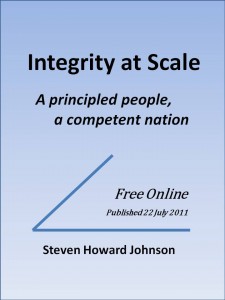
Recommended by Contributing Editor John Steiner
Chapters with Links Below the Line
Continue reading “Reference: Integrity at Scale Free Online Book”

Recommended by Contributing Editor John Steiner
Chapters with Links Below the Line
Continue reading “Reference: Integrity at Scale Free Online Book”
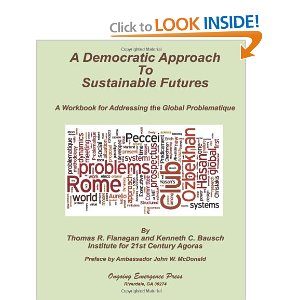
Thomas R. Flannagan, Kenneth C. Bausch
QUOTE (viii): This is the book to prepare for the messy multi-layered, multi-faceted, personal, political real world of applied activism.
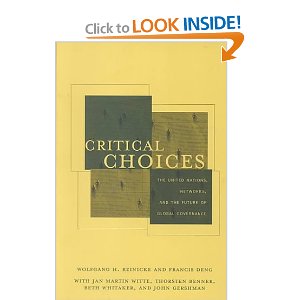
Wolfgang H. Reinicke (Editor), Francis Deng (Editor), Jan Martin Witte (Editor), Thorsten Benner (Editor), Beth Whitaker (Editor), John Gershman (Editor)
5.0 out of 5 stars Global Hybrid Network Governance Primer for UN+, July 21, 2011
By Robert D. Steele (Oakton, VA United States) – See all my reviews
Last week I reviewed the first book on this topic by the first author (Wolfgang Reinicke), Global Public Policy: Governing Without Government. I overlooked that book published in 1998, and this book in 2000, for lack of consciousness. Evidently others did as well given the lack of reviews. What makes both these books even more important now is the appointment of the primary author, Wolfgang Reinicke, to the position of inaugural dean of the school of public policy at the Central European University founded and richly endowed by George Soros. To understand how much George Soros has broken away from the government-financial crime axis, his essay free online and also the first fifty-seven pages of The Philanthropy of George Soros: Building Open Societies is essential reading.
I read this book at three levels: for content on its merits; for insight into the specific individuals and agencies behind the book; and for insight into where George Soros might be hoping that Dean Reinicke will go with network governance, what some of us call Panarchy, which is rooted in what we call M4IS2 (Multinational, Multiagency, Multidisciplinary, Multidomain Information-Sharing and Sense-Making). In other words, secrecy is out, transparent true cost information about everything is in–transparency breeds truth, truth breeds trust, and this is how we achieve a non-zero prosperous world at peace that works for all, not just the top 1%.
On page 91 one finds a quote better suited to the front matter, from Kofi Annan:
QUOTE (91): The United Nations once dealt only with governments. By now we know that peace and prosperity cannot be achieved without partnerships involving governments, international organizations, the business community, and civil society.
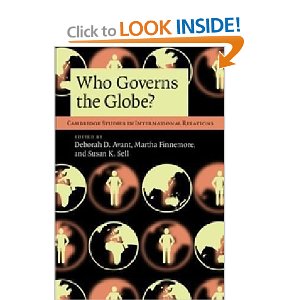
“This path-breaking collaborative work illuminates complex social and political relationships that constitute governing authority in a changing world. New questions provoke deeper reflection than the term ‘global governance' typically stimulates. Specialists need to read this fine book, and so do students.” Louis W. Pauly, Canada Research Chair in Globalization and Governance, University of Toronto
“This volume makes and illustrates an important fact about global governance today: it isn't only or always the institutional form of actors – be they states, corporations, or NGOs – but their relationships with key constituencies and with one another that shape governance outcomes. Authority, the essence of governance, comes in many guises. I recommend this book highly.” John Gerard Ruggie, Harvard University
Academics and policymakers frequently discuss global governance but they treat governance as a structure or process, rarely considering who actually does the governing. This volume focuses on the agents of global governance: ‘global governors'. The global policy arena is filled with a wide variety of actors such as international organizations, corporations, professional associations, and advocacy groups, all seeking to ‘govern' activity surrounding their issues of concern. Who Governs the Globe? lays out a theoretical framework for understanding and investigating governors in world politics. It then applies this framework to various governors and policy arenas, including arms control, human rights, economic development, and global education. Edited by three of the world's leading international relations scholars, this is an important contribution that will be useful for courses, as well as for researchers in international studies and international organizations.
Conference: Who Governs the Globe?
November 16 & 17, 2007

Nathan A. Allen
![]() Six Star Pre-History Ignored Until Now, July 17, 2011
Six Star Pre-History Ignored Until Now, July 17, 2011
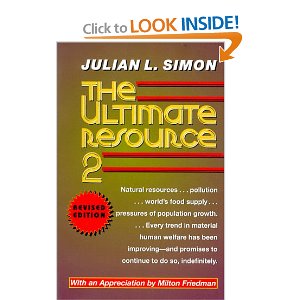
Julian Lincoln Simon
5.0 out of 5 stars The doomslayer falls,April 4, 1998
By A Customer
On Sunday, February 8th, psychologist and economist Julian L. Simon succumbed to a heart attack in Maryland. It is difficult to overstate the damage his death will cause the world debate on overpopulation, natural resources, and the environment. Dr. Simon's prolific and energetic mind gave rise to fourteen books and countless papers and lectures, dedicated to overthrowing the dogma that underlies so much of today's environmental discourse.
Simon, still considered a maverick after thirty years of relentless data-gathering, impeccable empirical work, and well-thought out conclusions, questioned the unquestionable. He maintained that the earth is in good shape by every conceivable measure, and that the environmental situation continues to improve each year. Every index of human happiness – food prices, net income, infant mortality, life expectancy, disease rates – has steadily improved. He documented those claims with reams of data, culminating in his 1996 tour de force The State of Humanity. It is absolutely comprehensive, and contains enough obscure data to make the most jaded Trivial Pursuit fan squirm (if you ever want to read about the average lower-class Brazilian's annual starch intake, look no further).
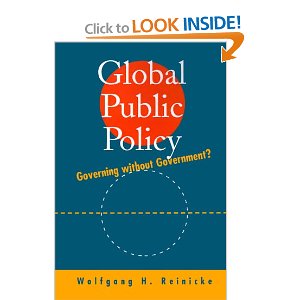
Wolfgang Reinicke
This is a pioneering work, easily a decade ahead of other world-class efforts, my favorite being that of (then) World Bank Vice President for Europe, J. F. Rischard, High Noon 20 Global Problems, 20 Years to Solve Them. It has been largely over-looked, but should gain additional importance, along with the author's additional book, Critical Choices. The United Nations, Networks, and the Future of Global Governance, now that George Soros is sponsoring the Central European University (CEU), and within that university, the author Wolfgang Reinicke has been appointed the inaugural dean of CEU's School of Public Policy and International Affairs. In the context of the essay by George Soros, the first 57 pages of The Philanthropy of George Soros: Building Open Societies, and the now hardened disenchantment with the nation-state system for being ignorant, biased, and non-agile (these and other deficiencies are marvelously articulated by Professor Philip Allot of Cambridge in The Health of Nations: Society and Law beyond the State, one can surmise that Dean Peinicke will seek to focus on integrationist endeavors that demand transparency and accountability for multiple stakeholders in return for stability and mutual gain.
Continue reading “Review: Global Public Policy – Governing Without Government?”